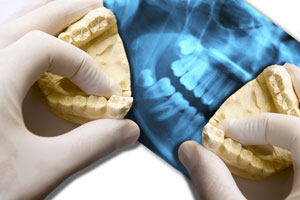Should bite-mark experts be permitted to testify in criminal trials? An editorial in the San Antonio Express-News suggested that “Texas prosecutors and judges should maintain the integrity of the criminal justice system by voluntarily declaring a moratorium on the use of bite-mark evidence.” Responding in an op-ed, a Texas judge contends that a moratorium “is no solution.”
The controversy echoes a debate among experts as to whether the identification of a suspect based on bite marks has any scientific validity. The Texas Forensic Science Commission recently joined that debate by advocating against the admission of expert bite-mark testimony in criminal trials.
Texas Forensic Science Commission
The Texas Forensic Science Commission is making a diligent effort to improve the state’s criminal justice system by assuring that expert witnesses who profess to base opinions on science actually have a scientific foundation for those opinions. The Commission recognizes that Texas judges have an unfortunate history of permitting expert witnesses to help prosecutors obtain unwarranted convictions by rendering opinions that are unsupported by a valid scientific methodology.
The Commission was created in response to revelations that the Houston Crime Lab regularly used shoddy analytic procedures and employed unqualified experts who told lies in court that contributed to the conviction of innocent defendants. The Commission is now viewed as a pioneer in the effort to prevent innocent defendants from being convicted on the basis of expert scientific opinions that are unsupported by modern science. In addition to bite-mark evidence, the Commission is scrutinizing the subjective opinions routinely offered by experts in hair identification and arson investigation.
At a meeting of the Commission’s Bite Mark Analysis Panel in February 2016, Dr. David Senn, a forensic odonatologist who champions bite-mark analysis, explained that “research relating to bite-mark analysis is slow going, but being developed.” At an earlier meeting, Dr. Senn told the panel that a “competent forensic dentist … can look at a bite and create a profile about what kind of teeth could’ve made it if there’s sufficient information in the bite mark.” The problem, Dr. Senn said, is that 85{d61575bddc780c1d4ab39ab904bf25755f3b8d1434703a303cf443ba00f43fa4} to 90{d61575bddc780c1d4ab39ab904bf25755f3b8d1434703a303cf443ba00f43fa4} of the injuries he reviews lack sufficient detail to be compared with a suspect’s teeth.
Other experts are skeptical of a dentist’s ability to match bite marks with teeth even under optimal conditions. As skin stretches or contracts, the relative position of marks on the skin changes. Some bite mark analysts have been tempted to move the skin on which bite marks are displayed until it matches a suspect’s teeth. Even when experts try to reach an objectively accurate result, studies show that bite-mark analysis has an error rate of up to 64{d61575bddc780c1d4ab39ab904bf25755f3b8d1434703a303cf443ba00f43fa4}.
One study, using teeth held in place by a clamp to make bite marks on cadavers, found that no two bites produced the same marks. The researchers concluded that human skin does not reliably record the patterns of teeth and that the absence of consistent marks produced by the same set of teeth undermines the possibility of matching bite marks to suspects.
Another study questioned whether dentists are even capable of recognizing bite marks. Researchers showed 100 pictures of bite marks to 38 dentists who each had at least 20 years of experience. The dentists disagreed about whether 96 of the 100 pictures depicted bite marks.
Bite-Mark Evidence in Texas Courts
A member of the Forensic Science Commission who is also a professor at Texas A&M’s Baylor College of Dentistry observed that too many Texas judges rely on precedent rather than science to admit bite-mark evidence. The Commission’s general counsel agreed that scientific evidence should be admitted as proof of guilt only if it is based on sound science, not “just because the judge says it’s okay.”
The Bite Mark Analysis Panel recommended a moratorium on the use and admission of bite-mark evidence in Texas courts until acceptable scientific standards are created that will guide the expert opinions rendered by forensic dentists. While the editorial board of the San Antonio Express-News agreed with that suggestion, District Judge Robert Barton pointed out that judges have no power to issue moratoria. They apply rules of expert evidence admissibility on a case-by-case basis.
Texas follows its own version of the Daubert standard for the admission of expert testimony. Using that test, the state’s Court of Criminal Appeals upheld the introduction of bite-mark evidence in a 1990 decision. The wisdom of admitting bite-mark evidence as proof of guilt should give judges pause after Texas court found that unreliable bite-mark evidence formed the basis for one of the state’s most notorious wrongful convictions.
While Judge Barton expressed concern that the blanket exclusion of bite-mark evidence would be “arbitrary,” some might conclude that expert evidence with a 64{d61575bddc780c1d4ab39ab904bf25755f3b8d1434703a303cf443ba00f43fa4} error rate is arbitrary, and that its exclusion is a safeguard against unjust convictions. Since expert testimony can have a profound impact on a jury, certain kinds of scientific evidence have consistently been deemed inadmissible for fear that juries might give the evidence undue weight. Polygraph evidence is a long-standing example.
While trial judges have no authority to impose a moratorium, Texas appellate courts have the authority to rule that bite-mark evidence is too unreliable to satisfy the state’s standard of admissibility. More importantly, legislatures can decide as a matter of policy that bite-mark evidence should be excluded as proof of guilt in criminal trials unless and until the legislature is convinced that it is supported by sound science.
Given the work of the Forensic Science Commission, it is difficult to believe that responsible judges would continue to permit the introduction of bite-mark evidence as proof of guilt in a criminal trial. Whether that possibility should be eliminated by the declaration of a moratorium is a question that the state legislature should seriously consider.




